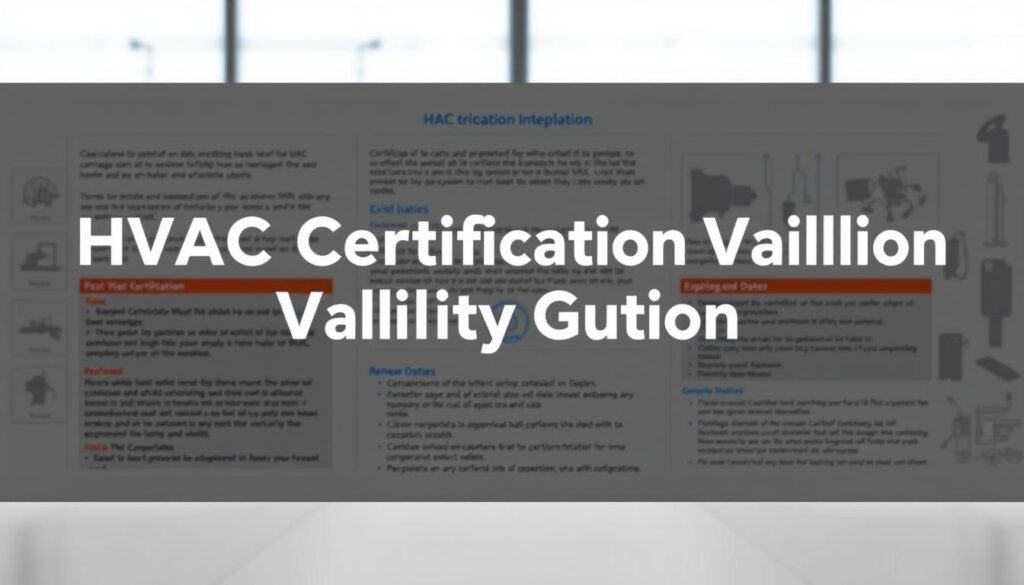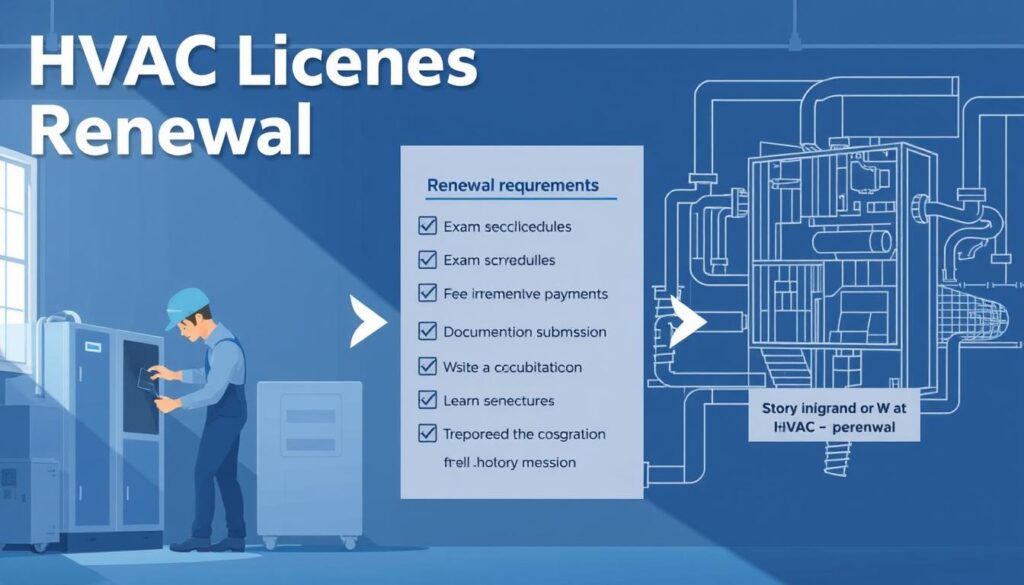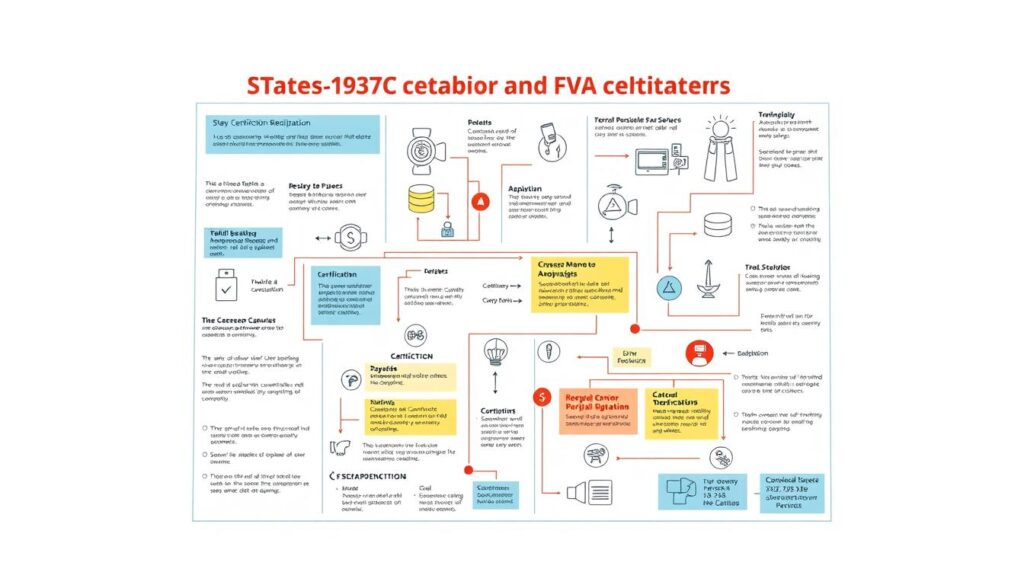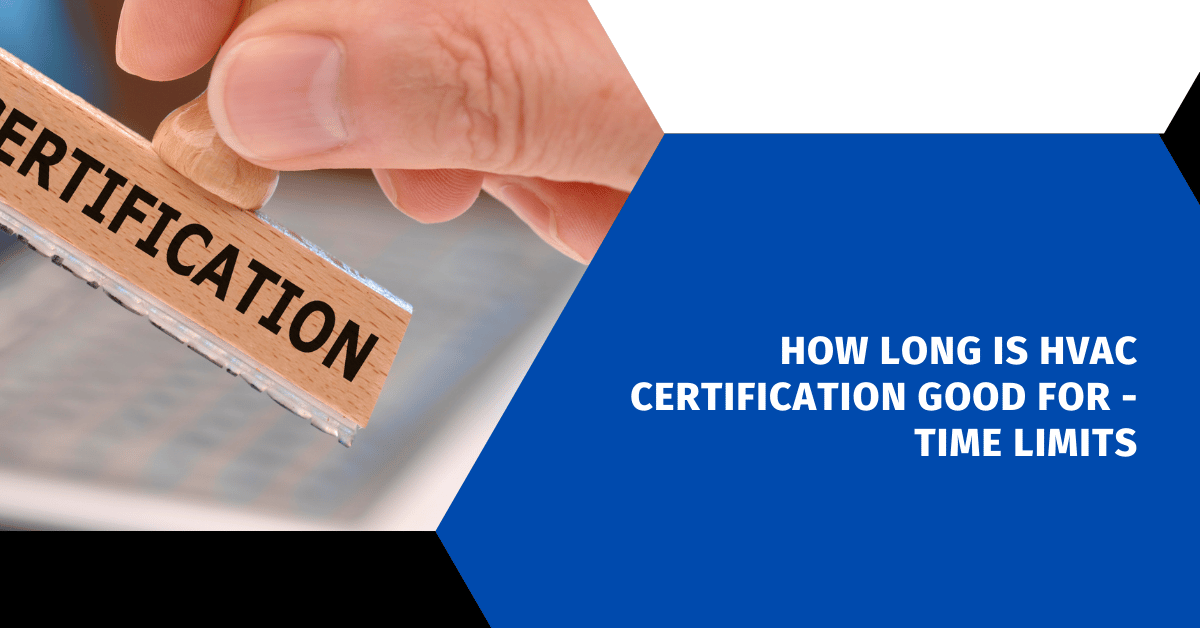Affiliate Disclosure
HVAC Guide Guys is a participant in the Amazon Services LLC Associates Program, an affiliate advertising program designed to provide a means for sites to earn advertising fees by advertising and linking to Amazon.
How Long Is HVAC Certification Good For? Are you curious about how long your HVAC certification is good for? Knowing this is key to keeping your career moving forward. It also helps you stay in line with industry rules.

HVAC certification is more than a piece of paper. It’s your ticket to a successful career in technical services. The length of time your certification is valid can change. Some last forever, while others need to be renewed.
The EPA Section 608 Certification is special. It’s needed for working with refrigerants and never expires. So, you can keep your professional status without needing to renew it often.
Understanding how long HVAC certification lasts can be tricky. It depends on the type of certification, state laws, and industry standards. Your career path depends on keeping up with your certifications.
Key Takeaways
- EPA Section 608 Certification does not expire
- HVAC certification validity varies by certification type
- Some credentials require periodic renewal
- State regulations impact certification duration
- Continuing education can help maintain certification status
Table of Contents
Understanding HVAC Certification Basics
Getting into HVAC certification can be complex. You need to pick the right programs that fit your career goals. These programs help you grow your skills.
HVAC certification makes sure technicians are ready for the job. It covers all the technical skills needed. This training is key for a successful HVAC career.
Types of HVAC Certifications
There are many paths for HVAC professionals:
- Trade School Programs (6-12 months)
- Associate Degree Programs (2 years)
- Apprenticeship Programs (3-5 years)
- Certificate Programs (6 months)
- Industry Certifications (NATE, HVAC Excellence)
Core Certification Requirements
To become a certified HVAC technician, you’ll need to:
- Finish your education
- Get hands-on experience
- Pass exams
- Get EPA Section 608 Certification
Industry Standards and Regulations
The HVAC industry follows strict rules. The EPA Section 608 Certification is key. It lets technicians work with refrigerants safely and legally.
| Certification Type | Focus Area | Exam Complexity |
|---|---|---|
| Type I | Small Appliances | Entry Level |
| Type II | High-Pressure Systems | Intermediate |
| Type III | Low-Pressure Systems | Advanced |
| Universal | All Refrigeration Systems | Comprehensive |
Choosing the right HVAC programs keeps you ahead in this fast-growing field.
Explore Our HVAC Shop
Looking for top-rated HVAC tools, parts, and accessories? Visit our shop and find the perfect solution for your needs.
Visit the ShopEPA Section 608 Certification Duration
The EPA Section 608 Certification is key for HVAC techs. It lets them work with refrigerants safely and legally. This certification doesn’t expire, making it valuable for a long time.
There are four types of EPA Section 608 Certifications. Each is for different refrigeration and air conditioning systems:
- Type I Certification: Covers small appliances with five pounds or less of refrigerant
- Type II Certification: Focuses on high-pressure and very high-pressure appliances
- Type III Certification: Addresses low-pressure appliance systems
- Universal Certification: Enables work on most air conditioning and refrigeration equipment
The HVAC certification duration for EPA Section 608 is special. It’s valid forever. So, once you get it, you don’t have to renew it. It shows you know how to handle refrigerants and follow environmental rules.
Getting this certification is vital for HVAC techs. Breaking the Clean Air Act can lead to big fines, up to $37,500 a day. So, having the right certification is key for your job.
Protect your career and the environment by securing your EPA Section 608 Certification.
Explore Our HVAC Shop
Looking for top-rated HVAC tools, parts, and accessories? Visit our shop and find the perfect solution for your needs.
Visit the ShopHow Long Is HVAC Certification Good For
Knowing how long your HVAC certification is good for is key to keeping your skills up to date. Each type of certification lasts a different amount of time. This affects your job chances and if you meet industry rules.
The world of HVAC certification expiration can be tricky. Here are some important points about how long certifications last:
- NATE Certification: Changed to a two-year validity period for certifications issued after January 2014
- EPA Section 608 Certification: Unique in that it never expires
- Continuing education requirements have been streamlined, reducing renewal complexity
Validity Periods for Different Certification Types
Your HVAC license renewal depends on several factors. Professional certifications usually last from two to five years. The exact time and what you need to do can change based on the certification and your area of focus.
- Certificate Programs: 6-12 months duration
- Associate Degree: 2-year program
- Bachelor’s Degree: 4-year training
State-Specific Time Limits
Rules for HVAC certification expiration vary by state. Some places need you to renew more often or complete extra education. Always check with your local licensing board for the exact rules.
Renewal Requirements
To keep your certification, most require:
- Completing continuing education hours
- Passing renewal exams
- Showing you have worked in the field
- Paying renewal fees
Being proactive about your HVAC license renewal helps you stay ahead and follow industry rules.
Type I EPA Certification Limitations
Understanding Type I EPA Certification is key for HVAC technicians. This certification is for small appliances with refrigerant under five pounds.
With Type I EPA Certification, technicians get to work on compact cooling systems. You can handle specific equipment types:
- Window air conditioning units
- Household refrigerators
- Residential dehumidifiers
- Small standalone cooling devices
This certification shows you can safely work with refrigerant in small appliances. It proves you can do maintenance and repairs in a specific area.
| Certification Characteristic | Type I EPA Certification Details |
|---|---|
| Refrigerant Capacity Limit | 5 pounds or less |
| Applicable Equipment | Small residential cooling appliances |
| Certification Duration | Lifetime (no expiration) |
Even though Type I certification is useful, it only covers a small part of HVAC work. If you want more opportunities, consider getting more EPA certifications.
Explore Our HVAC Shop
Looking for top-rated HVAC tools, parts, and accessories? Visit our shop and find the perfect solution for your needs.
Visit the ShopType II and III Certification Time Frames
Understanding HVAC certification validity is key for career growth. The EPA offers special certifications for different systems and work places.
High-Pressure Systems Certification
Type II certification is for high-pressure systems in homes and small businesses. Your training will include:
- Residential air conditioning systems
- Heat pump equipment
- High-pressure refrigeration units
Low-Pressure Systems Requirements
Type III certification is for low-pressure systems in big businesses and factories. You’ll learn about:
- Commercial chillers
- Large cooling systems
- Complex refrigeration networks
Universal Certification Benefits
Universal Certification covers all HVAC systems. It’s great for those who want to work in many places.
| Certification Type | System Coverage | Career Opportunities |
|---|---|---|
| Type II | High-Pressure Systems | Residential/Light Commercial |
| Type III | Low-Pressure Systems | Industrial/Commercial |
| Universal | All System Types | Broadest Work Scope |
Choosing your HVAC certification depends on your career goals. Think about what systems you want to work with before making a choice.
HVAC License Renewal Process

Keeping your HVAC license up to date is important. Most states require you to renew your license every few years. This ensures you know the latest in the field and follow safety rules. The renewal process has several steps to protect both you and your customers.
The steps for renewing your HVAC certification vary by state. But, they usually include:
- Documenting your work experience
- Finishing required continuing education
- Submitting your renewal application
- Paying the renewal fees
Start getting ready for your HVAC certification renewal about 30-60 days before it’s due. Renewal fees are usually between $450 and $530. If you renew late, you might face extra costs.
Here are some tips for a smooth renewal:
- Keep track of when your license expires
- Check what your state needs for renewal
- Keep your work history and documents up to date
- Plan for renewal fees and any extra education costs
Pro tip: Some states let you renew online. This can save you time if you’re busy with work.
Explore Our HVAC Shop
Looking for top-rated HVAC tools, parts, and accessories? Visit our shop and find the perfect solution for your needs.
Visit the ShopMaintaining Your HVAC Certification Status
Keeping up in the HVAC world is more than just getting certified. You need to grow and learn constantly. This keeps your skills sharp and you in demand.
To stay ahead, you must follow a few important steps. These help keep your HVAC certification current and your skills up to date.
Continuing Education Requirements
Many states require HVAC pros to take ongoing education. Here’s what you might need:
- 8 hours of continuing education before your license renewal
- At least 1 hour on state-specific rules
- Stay current with new tech and standards
Professional Development Options
There are many ways to boost your skills. Look into HVAC certification courses that can help:
- Online workshops and webinars
- Technical seminars
- Industry conferences
- Training from manufacturers
Documentation and Record Keeping
Keeping accurate records is key to keeping your certification. Track your continuing education, renewal dates, and certifications well. This makes sure you can renew your license smoothly.
Here’s how to keep good records:
- Have both digital and physical copies of your certifications
- Apply for renewal 30-60 days before it’s due
- Log all your training hours carefully
Professional growth is the key to long-term success in the HVAC industry.
Explore Our HVAC Shop
Looking for top-rated HVAC tools, parts, and accessories? Visit our shop and find the perfect solution for your needs.
Visit the ShopState-Specific HVAC Certification Requirements

Understanding HVAC certification rules can be tricky. Each state has its own set of rules. Knowing these rules is key to your success as an HVAC technician.
Requirements for HVAC certification vary a lot from state to state. It’s important to check the local rules before starting your career.
Some states have strict rules for HVAC technician certification. For example:
- Alabama demands 3,000 hours of work experience under a licensed contractor
- California requires four years of experience within the previous ten years
- Connecticut offers 21 different heating and cooling license types
- Georgia differentiates between Class I and Class II license requirements
State rules can greatly affect your career. Certification standards range from minimal documentation to rigorous multi-step processes. Some states like Colorado and Illinois have no statewide licensing. Others, like Maryland, have detailed experience and insurance requirements.
When you’re getting HVAC certification, keep these things in mind:
- Check the local licensing requirements
- Keep a detailed record of your work experience
- Get ready for any state-specific exams
- Plan for application and renewal fees
Your career growth depends on knowing the HVAC certification rules in your state. Research, preparation, and following the rules are essential for a successful HVAC technician career.
Cost Factors in HVAC Certification Renewal
Understanding the cost of HVAC certification programs is key for career advancement. Online programs cost between $800 and $3,000. In-person trade schools can reach up to $15,000. Your total cost depends on the certification and training method you pick.
Renewing your HVAC certification has several costs. Technician exam fees are about $100, and license activation can cost $75 to $150. Certifications usually need renewal every 2-5 years. This means you’ll need to budget for ongoing learning.
Investing in HVAC certification can open up more job opportunities and higher pay. The HVAC industry is expected to grow 6% by 2032, adding over 20,000 workers. In North Carolina, HVAC workers make an average of $52,960 a year. This makes the initial and renewal costs a good long-term investment.
To manage certification costs, look for affordable training. Online programs and community college or technical school options are good choices. Certificate programs start at $2,000, and associate degrees offer more training at a fair price. Planning your certification expenses can lead to a successful and financially stable HVAC career.
FAQ
How long is an EPA Section 608 Certification valid?
Do all HVAC certifications have the same validity period?
What types of EPA Certifications are available?
How often do I need to renew my HVAC state license?
What continuing education is required to maintain my HVAC certification?
How much does HVAC certification cost?
How long is an EPA Section 608 Certification valid?
Do all HVAC certifications have the same validity period?
What types of EPA Certifications are available?
How often do I need to renew my HVAC state license?
What continuing education is required to maintain my HVAC certification?
How much does HVAC certification cost?
FAQ
How long is an EPA Section 608 Certification valid?
The EPA Section 608 Certification does not have an expiration date. Once you get it, it’s good for your whole career. You just need to keep up with the rules and standards for handling refrigerants.
Do all HVAC certifications have the same validity period?
No, they don’t. The EPA Section 608 Certification never expires, but state HVAC licenses need renewal every 2-3 years. You must complete continuing education to keep your license current.
What types of EPA Certifications are available?
There are four EPA Refrigerant Certifications: Type I, Type II, Type III, and Universal. Type I is for small appliances, Type II for high-pressure systems, Type III for low-pressure systems. Universal Certification covers all these areas.
How often do I need to renew my HVAC state license?
HVAC licenses usually need renewal every 2-3 years. You’ll need to do continuing education, show work experience, and pay a fee. Each state has its own rules, so check yours.
What continuing education is required to maintain my HVAC certification?
Continuing education hours vary by state and certification. You’ll need 4-16 hours of approved courses. These cover new technologies, safety, and industry updates. They keep you up-to-date and professional.
How much does HVAC certification cost?
HVAC certification costs range from 0 to
FAQ
How long is an EPA Section 608 Certification valid?
The EPA Section 608 Certification does not have an expiration date. Once you get it, it’s good for your whole career. You just need to keep up with the rules and standards for handling refrigerants.
Do all HVAC certifications have the same validity period?
No, they don’t. The EPA Section 608 Certification never expires, but state HVAC licenses need renewal every 2-3 years. You must complete continuing education to keep your license current.
What types of EPA Certifications are available?
There are four EPA Refrigerant Certifications: Type I, Type II, Type III, and Universal. Type I is for small appliances, Type II for high-pressure systems, Type III for low-pressure systems. Universal Certification covers all these areas.
How often do I need to renew my HVAC state license?
HVAC licenses usually need renewal every 2-3 years. You’ll need to do continuing education, show work experience, and pay a fee. Each state has its own rules, so check yours.
What continuing education is required to maintain my HVAC certification?
Continuing education hours vary by state and certification. You’ll need 4-16 hours of approved courses. These cover new technologies, safety, and industry updates. They keep you up-to-date and professional.
How much does HVAC certification cost?
HVAC certification costs range from $100 to $1,500. This depends on the certification, exam fees, study materials, and prep courses. EPA Section 608 Certification costs $20-$150, while state licenses and other certifications can be more expensive.
Do HVAC certifications differ by state?
Yes, they do. While EPA Section 608 is federal, states have their own rules. Some require extra exams, work hours, or education. Always check your state’s rules before getting or keeping your certification.
What is the benefit of obtaining a Universal Certification?
Universal Certification offers the most work opportunities. It lets you work on small appliances, high-pressure, and low-pressure systems. This makes you more employable and flexible in the HVAC field.
,500. This depends on the certification, exam fees, study materials, and prep courses. EPA Section 608 Certification costs -0, while state licenses and other certifications can be more expensive.
Do HVAC certifications differ by state?
Yes, they do. While EPA Section 608 is federal, states have their own rules. Some require extra exams, work hours, or education. Always check your state’s rules before getting or keeping your certification.
What is the benefit of obtaining a Universal Certification?
Universal Certification offers the most work opportunities. It lets you work on small appliances, high-pressure, and low-pressure systems. This makes you more employable and flexible in the HVAC field.

